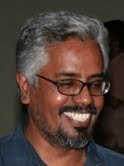VINODAYATRA

An Excursion into Malayalee Family
One distinguishing character of Sathyan Anthikad is that he knows his strengths very well and never ever strays from it. He is a chronicler of middle class malayalee family, and in film after film, he goes on elaborating its idiosyncrasies in umpteen number of ways. As a result, over time, he has created a niche audience for himself. In recent times, his focus seems to be the travails of women trying to find a way through the mess of malayalee society and economy. In films like Kochu Kochu Santhoshangal, Achuvinte Veedu and Rasathantram, the female characters are given a centrality that is rare in mainstream Malayalam cinema now.
In Vinodayatra, Sathyan Anthikad weaves together the stories of different families, moving from one to the other, and thus creating a web of narrations that talk about families that are broken, separated, traumatized, or yet to be. All the families that appear in the film are incomplete – either by accident or by design. Take for instance, the family who hosts the hero Vinod (a feeble performance by Dileep), that of Mukesh and his wife. They are childless, and the presence of their respective siblings disturbs that little space, threatening its insularity from within. Vinod himself is brought up by his sister and father – his mother died when he was young; and that makes yet another incomplete family. The other family narratives that enter the film, that of Innocent the worker at the dam, and of Ganapati the street child, are also both broken families.
If the first part of the film is centred around the arrival of Vinod and the ripples it create within his sister's family, the second part is centred around the family of Anupama (a vivacious Meera Jasmine). Her family is also scarred by various accidents. Her father, an ex-constable is incapacitated by a fatal wound that he received while on duty – during a communal riot at (where else?) Malappuram. It is significant that, while Anupama recounts the incident, we see him being stabbed by a typical Muslim. Obviously, the 'normal' and normative family or social unit is the middle class Hindu one, and what threatens its peace and existence is the Muslim other. Its obviousness is jarring, and lays bare the flip side of the 'common sense' that Sathyan Anthikad is often hailed for.
Another family that is incomplete is that of Anupama's elder sister. She is in love with a married man and has a child by him. He visits her only in the stealth of the night. Theirs is a family that is fated to hide itself from the public.
So what is this apparently comic yet a very bleak excursion through broken and incomplete families trying to tell us? The film offers several pointers and also many a time even explicitly pontificates upon the ills that mar our society: our obsession with international and progressive politics, our disdain for manual labour, our penchant for moonlighting, unionization, etc - all the favourite reasons Anthikad films have always reveled in. But the solutions that his films offer are regressive as they are totally circumscribed by the little institution of the nuclear family that is totally and 'carefully' insulated from the expanding horizons of malayalee life and times. Anything new or adventurous is anathema to it. For instance, in his world, any girl who ventures out of the family (Mukesh's sister in this film, like Achu's college mate in Achuvinte Veedu) is inevitably brought back into the fold – in both cases, not through force, but through logical reasoning! In a world where marriage and family is the rule, love is immaturity or infatuation. Interestingly, all kinds of extra-familial love are taboo in this world. The symptoms of the 'malaise' that the film indicates is the young girl's fascination for television!
So, in Sathyan Anthikad films, even when the women assert themselves and seek a career of their own, they have to strictly follow the rules of the patriarchal family, ironically one in which the patriarch is often absent or castrated. As a result these films live in a sterile world that stands on the ruins of the traditional family but dares not to dream of anything beyond or outside.
Labels: malayalam cinema, sathyan anthikad


1 Comments:
I heard that the movie sucks!
Post a Comment
Subscribe to Post Comments [Atom]
<< Home